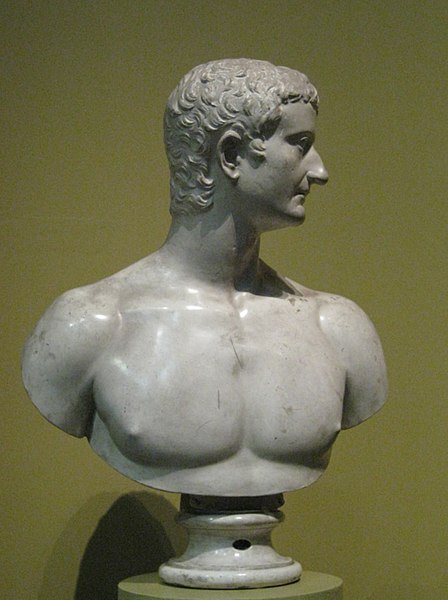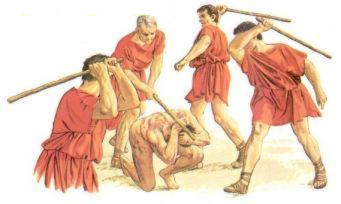The legacy of the Parthian invasion of AD3 was preserved in no small part by the subsequent dissemination of the Three Christianities throughout the Empire. The use of the rather poetic Latin translation of the Parthian King's preferred sobriquet -
Lucifer - as a by-word for treachery and evil was ensured by the ready association the early Christian church drew between the title and an obscure passage from Isaiah in which a supra-human figure acclaimed as the Morning Star (also
Lucifer) is cut down in his prime:
“How you are fallen from heaven, O Day Star, son of Dawn! How you are cut down to the ground, you who laid the nations low!"
Like King Herod before him,
Alexander Seleucus was seen as but one of a long line of human Antichrists who were to emerge as adversaries and persecutors of God's people. Lucifer in turn became the preferred name for the main antagonist in Christianity: certain sects were to give him added importance as an agent of divine justice and even as a god of death. The influence of Irano-Buddhism would even see him equated with the old Zoroastrian concept of the "
eternal lie", ironic given the historical correlation the Parthian Kings surnamed
Lucifer made between themselves and the "
eternal truth".
There are some who credit the campaign of AD3 with introducing Irano-Buddhism to the west at the very moment of Christianity's inception: Alexander Seleucus had neither the time nor the will to do so. At this moment in time Irano-Buddhism was a primarily internal affair, intended to strengthen a new dynasty's hold on a rapidly diminishing realm, lacking the philosophical sophistication and proselytizing tendencies Christianity would soon force it to develop. Alexander Seleucus did not initially intend to hold on to the territories he disturbed and perished soon after conceiving such a notion.
Nevertheless the influence of Alexander Seleucus was furthermore instrumental (some would say) in shaping the figure of Lucifer. The Dionysian
tryphé inherited by the Alexandrian Kings from their Ptolemaic ancestors was, to them, state propaganda which enhanced their supra-human status and presented them to the world as the bringers of prosperity and fertility. The Roman reaction to such ostentation - carried on as it was by more than one Caesar - would in turn shape Christian thought on the figure of Lucifer as embodying all things immoral, lascivious and indulgent. It was an image in stark contrast to the rather grave
pietas and
honestas which came to define Christian
felicitas.
One might also note how the arrival of three eastern Kings in Judaea might have easily morphed into the legend of the Magi, great men from the East who come as heralds of a new age. Nor is it hard to perceive the influence of
Gondophares and
Philip of Babylon[1] on two of the names given by later sources to the Magi:
Gaspar and
Balthasar (a form of
Belshazzar, an Old testament King of Babylon, and a possible throne name of Philip).
Jesus of Nazareth was not the first to be hailed as the Christ or Saviour-King, not even among the Jews, as shall be seen. Similar hopes of salvation had appended themselves to the career of
Mithridates VI of Pontus two generations before. Romans and Greeks alike had expected much in the form of a union of East and West, personified in the son of
Mark Antony and
Octavia: the son never came. Hopes shifted to
Octavian himself or to
Alexander Helios, Mark Antony's son by Cleopatra, but after Actium it was the son of Caesar and Cleopatra who was acclaimed as the long-awaited saviour and inaugurator of a new world order, a Golden age of peace and prosperity. It is therefore unsurprising that the early church should conflate the momentous aura of the
Anno Domini with the birth of the one they understood to be the true Christ.
Caesar Tiberius had hurried east at once, seeking to forestall the worst. He had only recently disbanded three legions[2]: he had thus only two legions (Legio IX Hispana and XXI Rapax) to accompany him without leaving Illyricum wide open to disaster itself. As it was the Parthian assault had mauled the Eastern legions: two others were soon found to have been lost by Gaius south of the second cataract.
Hispana and
Rapax were barely enough, even with the death of the Parthian King: though the ambush of
Ariobarzanes of Armenia had recovered some booty (including the corpse of Cleopatra) the Parthians had escaped with many Roman standards and thousands of captured legionaries.
Tiberius proceeded with all the brutality that the occasion required. Roman units which had fled from the Parthians were subjected to
decimatio, in which a tenth of the unit (determined by lots) was stoned or clubbed to death by his comrades. He put to death King
Aristobulus IV of Judaea and the tetrarch
Philip Boethus of Galilee for their complicity with the Parthians. Aristobulus' queen
Berenice also perished - a favour to Fortunatus and his wife[3].
Archelaus of Samaria was only spared by his friendship with
Berenike Caesaris: he was denied the kingly title, the lands previously owned by his siblings and the high priesthood, which was auctioned off to the highest bidder. Tiberius refused the Jews when they asked him to crown
Antigone the Hasmonean[4] and placed Judaea and its environs under direct Roman rule. The numerous Herodian brood were shipped off to Rome. Edessa was sacked, its King,
Abgar, having escaped east with the Parthians. Reparation was demanded in the form of hefty tributes from Jerusalem, Damascus, Edessa and other places which had received the invaders.
In Antioch Tiberius had offered Berenike Caesaris his
amicitia. He had need of eastern friends just as she had need of a powerful Roman protector. Her presence at his side at this crucial point legitimized his position just as his at hers legitimized her own. She handed over to him the body of Alexander Seleucus, the city of Antioch and command of the Antiochene Guard: she also relinquished her right to sovereignty over Arabia in exchange for his ratification of Cleopatra's will, which had infringed on Roman authority by presuming to leave her Cyprus and Kush. Tiberius obtained the body of Cleopatra from King Ariobarzanes and entrusted it to Berenike. He also granted her the former tetrarchy of Hyrcanus, that is, the Phoenician coastline as far as Achzib, the Gaulanitis and Batanea towards the desert. Small territories but not without worth.
The young Queen soon quit Antioch and was conveyed in great ceremony to Egypt. There Cleopatra was interred in the royal necropolis near the
Sema, the tomb of Alexander the Great, and deified as a goddess of the royal cult. Her granddaughter (and adopted daughter) Berenike V was her first priestess and successor on the Pharaonic throne. She was styled
Berenike Kaisaris Philometor Dikaiosyne Kallinike, a complex titulature which carefully outlined her place in the world. She was not only the daughter and heir of Caesar Augustus (
Kaisaris) and the Queen of Kings (
Philometor, “mother-loving”), she was their equal as goddess and queen.
Dikaiosyne ("the just") pointed to her own divinity (as an avatar or type of Isis, like her predecessor, though Dikaiosyne was worshipped as a goddess in her own right) and promoted her as the bringer of justice to the East and Rome, whose greatest enemy she had assailed.
Kallinike (“beautiful victor”) the feminine of an epithet often employed by her Seleucid ancestors: a victory title and a declaration of international pretensions, perhaps.
The first place to accord her divine honors was naturally Antioch, where that same year Tiberius erected an altar to the justice of Berenike.
In the coins she struck she was depicted donning an elephant scalp (
exuviae elephantis), a reminder that she was both the heiress of the scalp's most famous wearer, Alexander the Great, and herself the symbolic conqueror of Parthia (and all their elephants). Associated with her (and Caesarion) on the throne was her young cousin and consort Antony Alexas. He was now
Ptolemy (XXI) Antonios Alexander III Philometor: the only honor conceded him was induction into the dynastic cult alongside Berenike as the
Neoi Theoi Philometores ("New Mother-Loving Gods"). Otherwise she ignored him in favour of Julianus, the son of Tiberius, whose lover she became.
Berenike V Caesaris Philometor Dikaiosyne Kallinike
, "Bel protects the King", a fitting throne name for Philip given his tumultuous reign.
[2] The Legio XVII Gallica and XVIII Gallica, created by Vipsanian, and the XXXI Italica, created by the Popular Senate during the civil war.
[3] The wife of Fortunatus was Glaphyra of Cappadocia. Her first husband was Alexander of Judaea, during which marriage she was in constant war against her husband's female relatives.
[4] Daughter of King Antigonus II, she married two of Herod's sons in turn: Antipater (who was executed for treason) and Aristobulus IV (who divorced her in order to take back his first wife).
In a way its an unfitting end for the great Cleopatra. But Berenike is already proving herself her grandmother's heiress. I wonder if the now Berenike V will be able to become as powerful as Cleopatra or end up being yet another client Queen.





